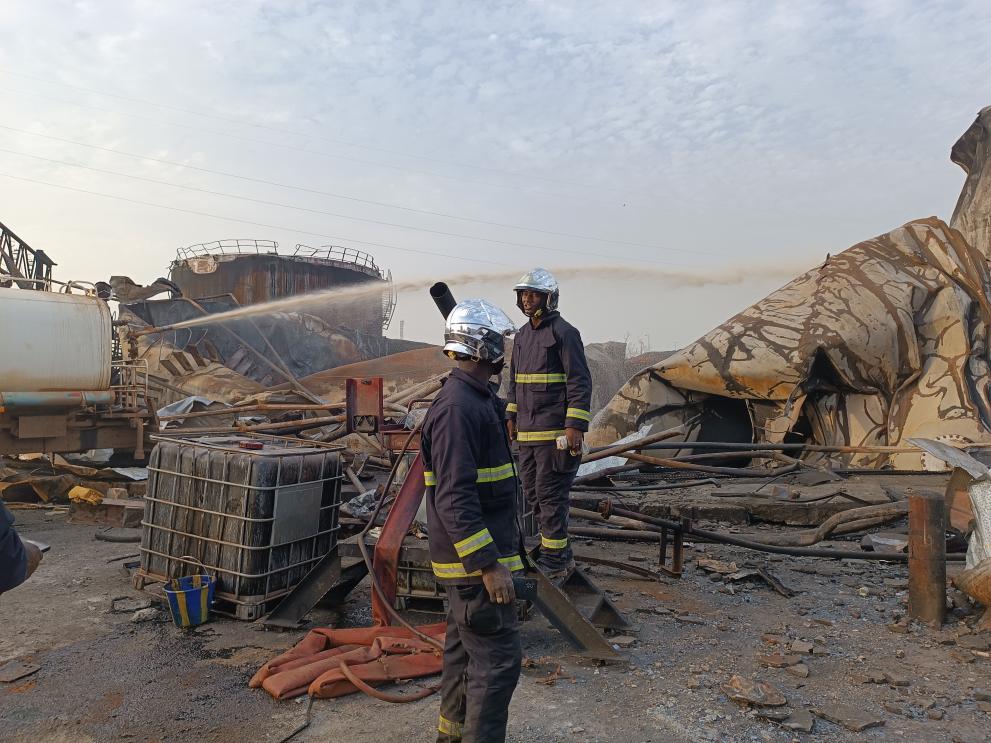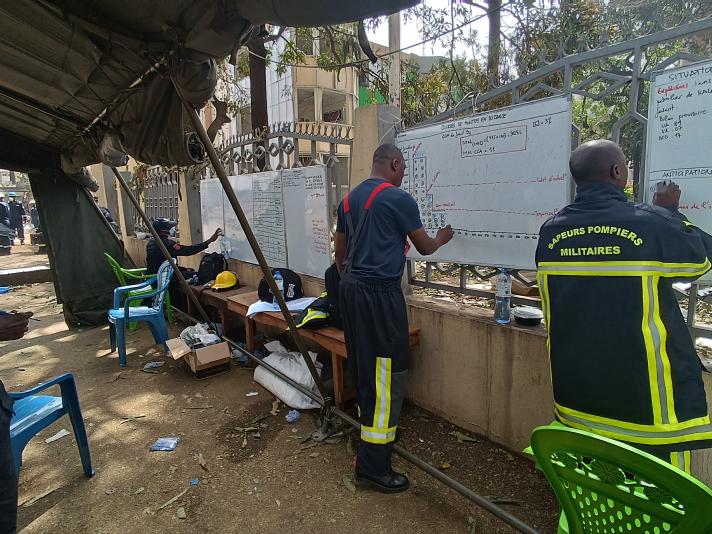
In December 2023, Ivory Coast extended critical support to Guinea when a catastrophic explosion and fire engulfed a petroleum storage facility in Kaloum. The disaster caused widespread devastation, claiming 24 lives and affecting more than 450 people, with significant socio-economic and environmental repercussions. Central to the response was Ivory Coast’s elite firefighting team, led by Colonel Serge Vital Oulai, whose training and leadership helped stabilize the crisis and mitigate further loss in record time.
This article highlights Colonel Oulai’s experience in leading the intervention and examines how the EU-supported CBRNe African Master’s program significantly contributed to his preparedness for such emergencies. His story underscores the broader value of regional collaboration and capacity-building in tackling complex CBRNe threats across Africa.
A rapid and coordinated response in Guinea
The Kaloum fire presented a critical test of regional emergency response capabilities. Within 24 hours of the explosion, Colonel Oulai had mobilized a multidisciplinary team of 30 personnel, including five specialists trained in CBRN threats, along with advanced detection tools and protective gear previously provided by the EU.
Upon arriving in Guinea, the team was met with a chaotic scene—damaged infrastructure, a lack of coordination, and insufficient firefighting resources. “When we arrived, there was no clear chain of command or strategy in place,” Oulai recalls. Leveraging his expertise, he quickly established a unified command structure, working diplomatically with Guinean officials and other international responders, including teams from Senegal.
The intervention unfolded in three critical phases:
- establishing safety perimeters and containing the fire’s spread,
- launching a targeted attack on the flames using calculated water volumes and cooling methods, and
- finally, ensuring site safety through environmental decontamination and medical care.
The rapid response, coordinated under Oulai’s leadership, contained the fire in just six days—a remarkable improvement compared to similar past incidents.
“The tools and methods we applied, particularly in risk assessment and operational planning, were directly informed by the knowledge I gained through the CBRNe African Master’s program,” Oulai says.
This strategic approach not only reduced the timeline for containment but also minimized environmental damage and preserved critical petroleum reserves.
Strengthening leadership and expertise
Colonel Oulai’s leadership during the crisis was the culmination of years of specialized training, much of which was acquired through the CBRNe Master’s program, supported by the EU CBRN Centres of Excellence. Enrolling in 2022, Oulai pursued the program to deepen his scientific and practical understanding of CBRN risks.
“The Master’s gave me more than technical skills—it instilled confidence and the ability to lead in high-stakes situations,” Oulai adds.
The curriculum included advanced training in risk calculation, leadership in crisis environments, and interdisciplinary collaboration. Importantly, it expanded his expertise beyond chemical threats, incorporating biological, radiological, and nuclear risks into his repertoire.
This comprehensive training has not only enhanced his role as Deputy Commander of Ivory Coast’s military firefighters but also positioned him as a national trainer and advisor on safety and security.
"The program has made me more competitive professionally and equipped me to engage with industrial leaders and government officials effectively," Serge points.
His ability to lead the complex intervention in Kaloum exemplifies the program’s real-world impact.
Advancing regional safety and security
The CBRNe African Master’s program has been a key initiative for fostering regional collaboration and building a network of highly skilled professionals across Africa. Colonel Oulai emphasizes the importance of this network during the Kaloum crisis: “We are more than colleagues—we are a team across borders.” The program has enabled graduates to establish connections that facilitate cross-border support, resource-sharing, and joint emergency responses.
Beyond individual achievements, the program’s impact on regional safety and security is undeniable. By equipping professionals with the tools and knowledge to address complex CBRNe threats, it has enhanced the resilience of nations across Africa.
“This training not only builds capacities within individual countries but also strengthens our ability to work together as a region,” Oulai notes.
Looking ahead, he calls for the expansion of such initiatives to sustain their positive momentum. “We need to train the next generation and extend these opportunities to more professionals. Regional exercises and simulations should also be prioritized to prepare us for future crises,” he says. He also advocates for stronger administrative frameworks to formalize and integrate CBRN response units into national and regional strategies.
A blueprint for future success
The successful intervention in Kaloum serves as a powerful example of how education, regional cooperation, and strategic investment in preparedness can save lives and mitigate disasters. Colonel Ouattara’s leadership, shaped by the CBRNe Master’s program, demonstrates the program’s tangible impact on addressing real-world challenges.
“Through this program, we’ve become more than responders; we’ve become leaders, ready to tackle even the most complex crises,” Oulai concludes.
His experience underscores the importance of such programs to ensure that Africa remains prepared for future crises and continues to build a safer and more secure future.
| First-of-its-kind specialised CBRNe African Master’s programme |
|---|
In 2023, the first-of-its-kind specialised CBRNe African Master’s programme achieved a milestone with the graduation ceremony of the first cohort of students at the International University of Rabat, Morocco. 21 trainees from six partner countries of the African Atlantic Façade region obtained their double degree, one form the Université de Haute Alsace, recognized by France’s Conférence des Grandes Écoles and one by the Université Internationale of Rabat, after completing an intensive training programme addressed at key managers and operational personnel involved in the CBRNe field. The development and launch of the CBRNe Master’s program were strongly advocated by the African Atlantic Façade CBRN Regional Secretariat of the EU CBRN CoE Initiative as part of its strategy to establish a CBRN training center for the region. The Master was funded by the European Union. |
Details
- Publication date
- 19 December 2024
- Authors
- Service for Foreign Policy Instruments | Joint Research Centre
- CBRN areas
- Crisis management
- First response
- Post incident recovery
- Protection of material/facilities
- Public and infrastructure protection
- Public health impact mitigation
- Safety and security
- CBRN categories
- Chemical
- CoE Region
- AAF - African Atlantic Façade


